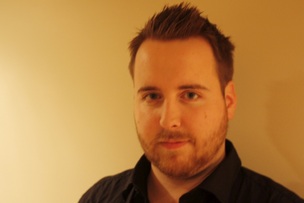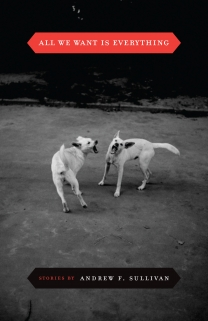 Andrew F. Sullivan Andrew F. Sullivan Andrew F. Sullivan is the author of All We Want is Everything (ARP Books, 2013). His short fiction has been published in places like Grain, EVENT, The New Quarterly and Joyland. Sullivan no longer works in a warehouse. Andrew Sullivan will be visiting Western University as part of the 2013-14 Creative Writers Series. Everyone is welcome to this free public reading in UC 224A on October 8th, 2013 at 2:30-4pm. Andrew's short story "Hatchetman" was published in Issue 2 of The Rusty Toque, and it appears in his new collection. RUSTY TALK WITH ANDREW F. SULLIVAN Alex Carey: What is your first memory of writing creatively? Andrew F. Sullivan: When I was nine or so, I started rewriting The Lost World starring my friends while I was supposed to be doing work at school. I would read it out loud at lunch or recess before we went to go and play soccer, or whatever. Usually, I would try to kill off one friend a day—by lion, spike pit, alien invaders or velociraptor. Maybe a grizzly bear. They seemed to get a kick out of it—who would I kill off next and how? Everyone’s time would come. It was like some volatile mixture of The Chronicles of Narnia, Indiana Jones, Jurassic Park, The Hardy Boys and The Neverending Story. Kill your darlings, or at least the people closest to you. AC: Why or how did you decide to become a writer? AS: I wanted to do something that made me feel good. I had a compulsion. A selfish compulsion to do what made me feel best. Even on the worst days, writing is what makes sense. I don’t need a studio or a massive budget or other people. I just need me. And that’s what can make it scary, too. You have no one else to blame. I decided to write because I had to write. Because if I didn’t, I’d end up doing something else selfish, with nothing to show for it but a long list of mistakes, debts and hospital visits. AC: Can you describe your writing process? AS: Find a library. Sit down with the laptop, headphones, and a bottle of water. Try to parse out the terrible things in my head, the lovely things we want to be true and the place where they meet in between. Take a number of breaks. Listen to the Russians yelling at each other in the newspaper section. Read about a toxic spill, a fallen idol, a country torn around the edges. Avoid getting run over by children. Clip and collage the pieces, the fragments that sound right. Force them into new shapes, uncomfortable shapes. Let it all sit for a couple weeks, let it simmer and grow old. Take a look at the mess a few weeks later and try to pick out the pieces that are still usable, that still make sense. This can take a while. For something like a novel, it’s pretty much the same deal, but I have to crank up production. AC: What is the best piece of writing advice you've been given that you use? AS: “Don’t talk about it, be about it.” – Usher, musical sensation. That is not a joke. I truly believe it. It’s very easy to talk about writing, to make lists and tips and line them up like they are tools and not suggestions. You need to actually write to write. That’s basically what it comes down to in the end. I can tell you to avoid using certain words, to establish conflict, to line edit every piece, to read aloud, to remove your adverbs, to roll the chicken knuckles, read the tea leaves, swallow the right pill or sacrifice your idols at the altar of taste, but it’s all equally ridiculous. Talking about it goes nowhere. Be about your work. Finish it. Believe in it. Send it out into the world. AC: You recently published a short story collection—twenty snapshots of decay, loss, violence and beauty—called All We Want is Everything. Your publisher, ARP Books, is based in Winnipeg and co-founded by songwriter John K Samson. How did you get involved with ARP and what was that experience like? AS: I got involved with ARP when I sent John K. my work just to see what he thought of it. I had a novel and a short story collection, and I wanted to get an outsider’s perspective on them. I knew ARP did not really publish a lot of fiction at the time, but they had in the past. I am grateful John found something in my work and decided to pick up the short story collection. Working with a small press is a really great experience in a lot of ways. I was involved in a lot of the decision-making and the process of taking my document and turning it into an actual book. The cover image I had since 2007 ended up working out. Overall, it was just an extremely collaborative and generous process. The fact that it exists at all is a positive for me. AC: You're also the fiction editor at The Puritan. What it is like be on the other side of the publishing process? As an editor, what do you look for in the work that you publish? AS: It’s extremely illuminating to work on the other side, to see how the sausage gets made. You learn just how many other people are out there, writing, struggling to get published, just asking for someone to read their work, to recognize their attempt to touch the world outside. You also see how so many people somehow fail to follow directions, to refuse to read the magazines they submit to or ask whether or not the story would suit the publication. You learn to take rejection with a bit more grace. You learn it is not always about you—sometimes there’s just too much good stuff out there. And sometimes there is a drought. I look for work that will grab me on the first page, work that will make me second guess my assumptions, make me uncomfortable with the world. Clear lines, well-oiled machines with well-drawn characters. I want to be led down a path I would not take on my own. What I don’t need are more narratives that start in bars, that chronicle addiction, that remind us cancer is bad, child abuse is bad, divorce is bad. Stories about discovering oneself, about degrading women, about the one time you went to Europe or Africa and realized you had privilege, stories about manic pixie dream girls, about the one night we all got wasted and one of our friends made a terrible decision, about grad school or the glory of being an atheist—I don’t really have much patience for that anymore. None of this is a decree though—there is always an exception. Every rule needs someone to break it, to expose the maker as a fraud. AC: Traditionally, short story protagonists experience an epiphany, a sudden realization of their circumstance. You’ve said in other interviews that you prefer ‘reckonings’—an evaluation or judgment of self and place. In “Crows Eat Well” the narrator says, “there is something to salvage. Even now, the crows eat well” (23). Is that a reckoning rather than an epiphany? AS: What follows in the story is pretty much the definition of a reckoning, but the moment you cite is much more reflective and contemplative, I suppose. If I have to name that moment in one way or another, I guess it still falls under the guise of a reckoning, a return to spoiled land, acknowledging what is left and what can be used. I’m definitely not against epiphanies in all their wonderful shapes and forms, just wary of them. It’s very nice to pretend fiction teaches us something, to assume we have participated in some grand revelation. Usually though, our stories reinforce the values we already hold, the expectations we already have established in the dominant culture. Subverting those values isn’t much better—you still end up acknowledging their power in the process. My idea of reckoning I guess comes down to consequences—those still teach us something, but they are rarely entirely internal. Something has to happen. AC: Most of your stories are set in real—and pretty bleak—settings: factories, fast-food restaurants, motels, low-income housing. Other stories in your collection like “Towers” and “Cloud” involve menacing natural forces that seem more metaphoric. Was that an intentional deviation? Do you see your work heading in a more absurdist or supernatural direction? AS: Not so much intentional, more like happenstance. Even in these terrible, surreal environments, I still want my characters to respond and act like people. If the characters and the narrative are strong, the setting will be accepted. To me, there is no difference between a world plagued with sinkholes and our own world. A world where the sky is filled with birds shitting on everything is not too absurd to me; it’s just a deviation from the mean. I really don’t need any more stories about writing professors or failed relationships couched in current comforts. I can just read people bitching about that stuff online. I welcome realism colliding with something that might be read as surreal or absurd. Our whole existence and the protective nature of our current climate wants things to make sense, for there to be reasons, to fully elaborate on all the mysteries out there in the universe. But sometimes there is just a hole. Sometimes we don’t know. And that’s terrifying and awesome—awe filled with a sense of dread, of being overwhelmed by the world. We control so little. We want a fence to tell us which side is real, but we’re the ones who end up building it. And it isn’t sturdy. And it isn’t stable. And some people are stranded on the other side. AC: What is your funniest or favourite literary moment, if you have one? AS: Whenever somebody thinks it’s a good idea to write a book. And if we are talking in literature, it’s a bit from Harry Crews’ A Childhood: A Biography of a Place when he writes about the Sears/Roebuck catalogue and growing up as a sharecropper: “Nearly everybody I knew had something missing, a finger cut off, a toe split, an ear half-chewed away, an eye clouded with blindness from a glancing fence staple. And if they didn’t have something missing, they were carrying scars from barbed wire, or knives, or fishhooks. But the people in the catalogue had no such hurts. They were not only whole, had all their arms and legs and eyes on their unscarred bodies, but they were also beautiful.”  ANDREW F. SULLIVAN'S MOST RECENT BOOK All We Want is Everything, ARP Books, 2013 Description from publisher: All We Want is Everything, Andrew F. Sullivan’s exceptional debut collection of short stories, finds the misused and forgotten, the places in between, the borderlands on the edge of town where dead fields alternate with empty warehouses—places where men and women clutch tightly at whatever fragments remain. Motels are packed with human cargo, while parole is just another state of being. Christmas dinners become battlegrounds; truck cabs and bathroom stalls transform into warped confessionals; and stories are told and retold, held out by people stumbling towards one another in the dark. Frightening, hilarious, filled with raging impotence and moments of embattled grace, All We Want is Everything is the advent of a tremendous new literary voice. |
Rusty Talk
Rusty Talk Editor: Archives
November 2017
Categories
All
|

 RSS Feed
RSS Feed
